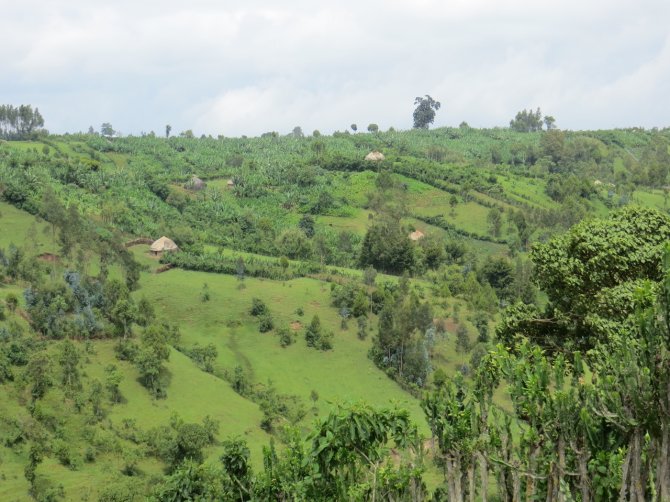Student information
Farms and farmers in Africa
Contact persons
Katrien Descheemaeker: katrien.descheemaeker@wur.nl
Jens Andersson: jens.andersson@wur.nl
Ken Giller: ken.giller@wur.nl
Farming systems in sub-Saharan Africa will undergo drastic changes in years to come, as the human population is increasing fast and increasing numbers of people suffer from poverty and food insecurity. Smallholder farmers are particularly vulnerable to changes in markets, land fragmentation and to the adverse effects of climate change. On the positive side, with currently large yield gaps for crops and livestock, African agriculture also exhibits unequalled potential for improvement. African agriculture will change tremendously in the coming decades and scientific understanding is needed to guide this transformation into a sustainable direction that will improve livelihoods and lead to a healthy environment. Potential solutions to the above challenges exist in the form of sustainable and/or agro-ecological intensification and climate-smart agriculture. These strategies strive for improved productivity and resource use efficiency of farming, in conjunction with improvements in the environmental, social and economic dimensions of sustainability. Whereas numerous promising agricultural options have been described and experimentally tested, the low uptake by smallholders of these options often remains problematic. In the research by PPS, we work with farmers and other local actors to better understand the constraints and opportunities of the farming system they are operating in, with the aim to better tailor the proposed options to that context. By exploring with farmers what could work for whom, where and why, we co-design innovative systems and pathways to a more sustainable future. Participatory research is at the core of this work, which combines diverse activities including (on-farm) experiments, crop and whole-farm modelling, household surveys, workshops and discussions with farmers and other actors.

Working with farmers to analyse their systems and sustainable futures
In order to develop inclusive and tailored options for sustainable and/or agro-ecological intensification, situated understandings of the multiple dimensions of smallholder farming systems and their drivers is needed. Participatory research among and with farmers and other stakeholders in the wider agricultural system is indispensable not only for the (co-) development of socially and environmentally sustainable futures, but also in assessing the uptake and adaptation of interventions in smallholder agriculture.
Thesis work under this sub-theme is focused on: (1) understanding the functioning of smallholder farming systems in development contexts, and; (2) the identification of options for (and/or constraints to) change, or; (3) the assessment of the outcomes and impacts of development interventions in smallholder agriculture. It typically builds on field research, uses and develops both quantitative and qualitative research methodologies (e.g. participant observation, resource flow mapping, interviews, focus group discussions, agricultural surveys, etc.). It situates farming practices in the context of farming households’ livelihood activities, the wider socio-economic environment, and the development (intervention) contexts in which agricultural research usually takes place, to explore (or evaluate) agro-technological change in smallholder farming systems together with those involved.
Agroecological Intensification of mixed crop-livestock systems
Mixed crop-livestock systems are the predominant farming system in many regions in sub-Saharan Africa. These systems are characterized by interactions between the crop and livestock component, such as the use of animal manure for crop fertilization and animal draught power for land cultivation and the use of crop residues as livestock feed. Agro-ecological or sustainable intensification of these systems can be achieved by options targeted at the crop component, the livestock component or through better integration of both. Examples include intercropping cereals with legumes, the use of adapted and nutritious crop varieties, the incorporation of fodder legume crops, better nutrient cycling by improved manure storage.
Thesis topics under this sub-theme typically consist of experimental work in which various improvement options are tested on-farm or on-station. Students collaborate with local researchers in the setup, monitoring and harvesting of trials. Field data collection is followed by data entry and statistical analysis of the data. Agronomic data collection can be combined with farmer evaluations.
Another type of thesis under this sub-theme can rely on modelling work. In this case, crop, livestock or farm-level models can be used to explore the potential effects of various improvement options (see theme 9 for more information on modelling). Modelling work can be combined with field work for data collection that is used in model calibration and testing; or with field work during which model results are discussed with farmers. In the latter case of participatory modelling, tools like visualizations or games can be used.
Finally, sustainable or agroecological intensification can be investigated through scenario analysis. A thesis subject on scenario analysis typically makes use of existing data (e.g. household characteristics, experimental trial data) to explore effects of contrasting future pathways. The effects can be assessed in multiple sustainability domains, allowing the analysis of trade-offs. This work can be combined with field work to discuss and refine the scenarios with different types of local stakeholders.
Co-learning with smallholder farmers (link with theme 10)
Co-learning by farmers and facilitators (e.g. researchers, development actors, extension agents) together helps to adapt farming options to the diversity of local conditions. Co-learning allows to enrich external knowledge and information about new options with farmers’ knowledge on local relevance and feasibility. In various projects, we implement iterative research and learning cycles together with farmers to develop shared and contextualized knowledge.
A thesis under this sub-theme can contribute to this research in various ways. Students can participate in the co-learning work with farmers and describe changes in farmers’ and researchers’ behaviour, perceptions and knowledge through participant observation, detailed farm monitoring, Q-methodology, in-depth interviews or other types of qualitative data collection. Alternatively, students can focus on visualization techniques that help to communicate research results or farmers’ views. Also, students can collaborate in household surveys and subsequent analyses to capture changes in farmers’ agency, competences and knowledge.